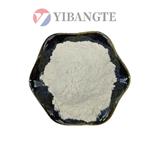Chemical Properties
The oil is obtained by steam distillation of chipped wood of Bulnesia sarmienti in approximately 3% yields. It has a woody, rose-like odor reminiscent of tea rose Sometimes the oil exhibits a smoky note.
Chemical Properties
Guaiac wood oil is obtained by steam distillation of ground wood and sawdust
from the tree Bulnesia sarmientoi Lorentz (Zygophyllaceae), which is up to 20m
high and grows wild in the Gran Chaco region of South America. In the recent
years, Paraguay has produced more than 150 t/yr.The oil is a dark yellowish, viscous
liquid with a mild, pleasant odor reminiscent of that of tea roses and faintly
of violets. The oil solidifies at room temperature to a yellow-white to light-ambercolored
mass (mp 40–50 ℃).
d
2525 0.9600–0.975; n
20D 1.5020–1.5070; α
20D ?12 ° to ?3 °; solubility: 1 vol in at
least 7 vol of 70% ethanol; solutions are sometimes slightly turbid or opalescent;
total alcohol content (calculated as guaiol): min. 85%.
The main constituents of the oil are the sesquiterpene alcohols guaiol and bulnesol. The oil may be used as a starting material
for the synthesis of guaiazulene, C
15H
18, which has anti-inflammatory
properties, and for the production of guaiyl acetate.
Guaiac wood oil is used extensively in perfume compositions for its excellent
fixative properties.
Uses
Guaiac Wood Oil is an essential oil and a fragrance ingredient used in soap and perfumery.. Some aromatherapy sources recommend Guaiacwood as an anti-inflammatory, for lymphatic drainage and its calming effects believed to be helpful for stress and anxiety.
Essential oil composition
The main constituent of the oil, also known as champaca wood oil, is guaiol, a sesquiterpene alcohol (85%).


